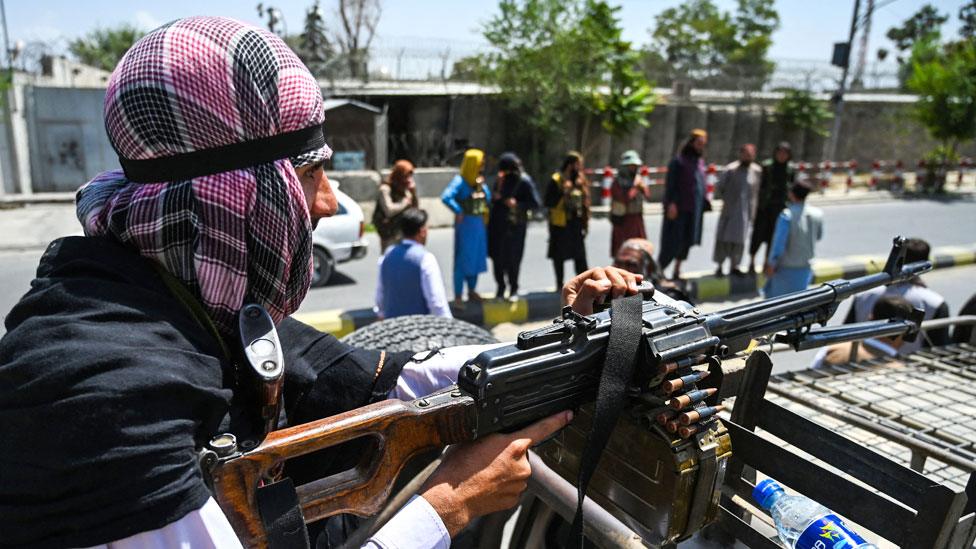UK confident it can get Britons out of Afghanistan, Ben Wallace says
- Published
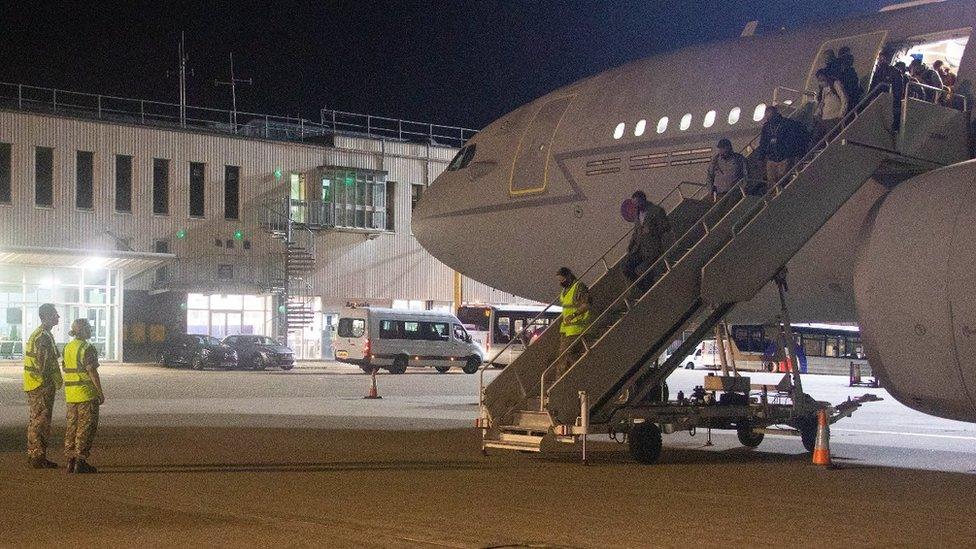
The first flight of British nationals and embassy staff arrived at RAF Brize Norton in Oxfordshire on Sunday evening
The UK government is confident it can get British nationals out of Afghanistan, with plans for hundreds more to leave in the coming days, the defence secretary has said.
Ben Wallace told the BBC the military part of Kabul's international airport was open and secure, enabling those eligible to leave for the UK.
The UK is also evacuating Afghans who worked for British forces.
But Mr Wallace said some who are eligible to leave would be left behind.
The Taliban has claimed victory after taking over the capital of Kabul.
Fighters have seized the presidential palace and the government has collapsed, with President Ashraf Ghani fleeing abroad.
Commercial flights from the airport have mostly been suspended, leaving hundreds of Afghans who were trying to escape stranded.
Eyewitnesses told the BBC at least three people died on Monday amid chaotic scenes on the civilian side of the airport.
But Mr Wallace said he had received assurances from the Taliban leadership via a Middle East country that the military part of the airport would be allowed to function, enabling UK officials and forces to help people leave.
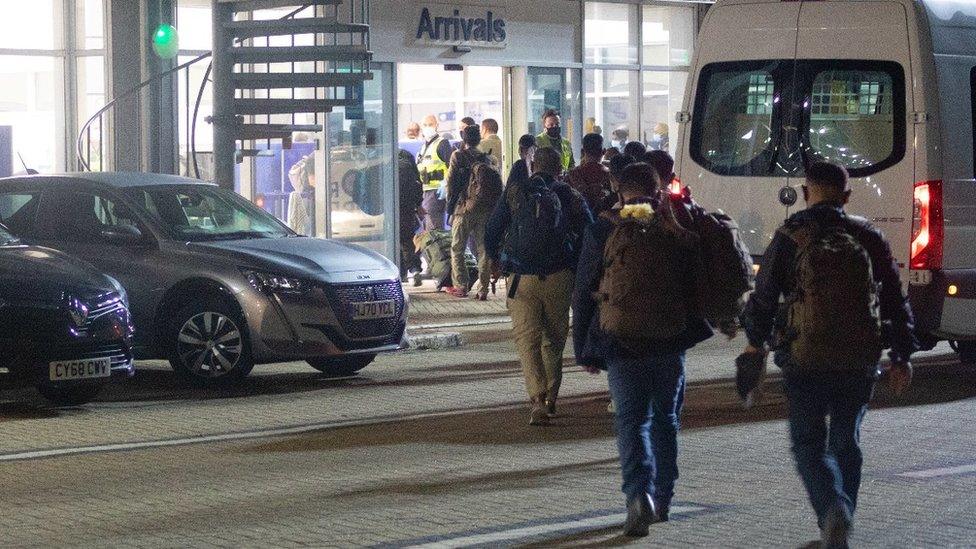
British forces have already helped hundreds of UK nationals leave Afghanistan
The Foreign Office has advised more than 4,000 British citizens thought to be in Afghanistan to leave.
About 600 British troops have been sent to Afghanistan to help evacuate UK nationals, as well as Afghan interpreters and other staff who worked for the UK, as part of Operation Pitting.
Mr Wallace said the government "will try our very best" to get all those eligible out of Afghanistan by 31 August or sooner.
"If we can manage to keep the airport running in the way we are putting in place our people to deliver then I'm confident that by the end of the month we could get everyone out and actually hopefully sooner," he said.
He added that some people would be left behind, for example those not currently in Kabul, but stressed the British evacuation programme was "open-ended" with no time-limit.
Speaking on LBC radio, Mr Wallace, who served in the British army in the 1990s, became emotional as he spoke of his regret that "some people won't get back".
Asked why he felt the situation "so personally", Mr Wallace replied: "Because I'm a soldier... because it's sad and the West has done what it's done, we have to do our very best to get people out and stand by our obligations and 20 years of sacrifice is what it is."
Allow X content?
This article contains content provided by X. We ask for your permission before anything is loaded, as they may be using cookies and other technologies. You may want to read X’s cookie policy, external and privacy policy, external before accepting. To view this content choose ‘accept and continue’.

Some 370 British nationals and Afghan interpreters flew out of Afghanistan on Saturday and Sunday, and Mr Wallace said the government was aiming to fly out a further 1,500 people over the next 24 to 36 hours or slightly longer.
"If we manage to keep it in the way we're planning to, we should have capacity for over 1,000 people a day to exit to the United Kingdom," he told BBC Breakfast.
"Currently, this is not about capacity on planes, it's about processing speeds, so that's why I'm trying to fix that."
Prime Minister Boris Johnson is chairing a meeting of the government's Cobra emergencies committee - the third in four days - to discuss the situation in Afghanistan.
Downing Street said the British ambassador, Sir Laurie Bristow, was working from the airport in Kabul, alongside UK staff and the armed forces, to process visas.
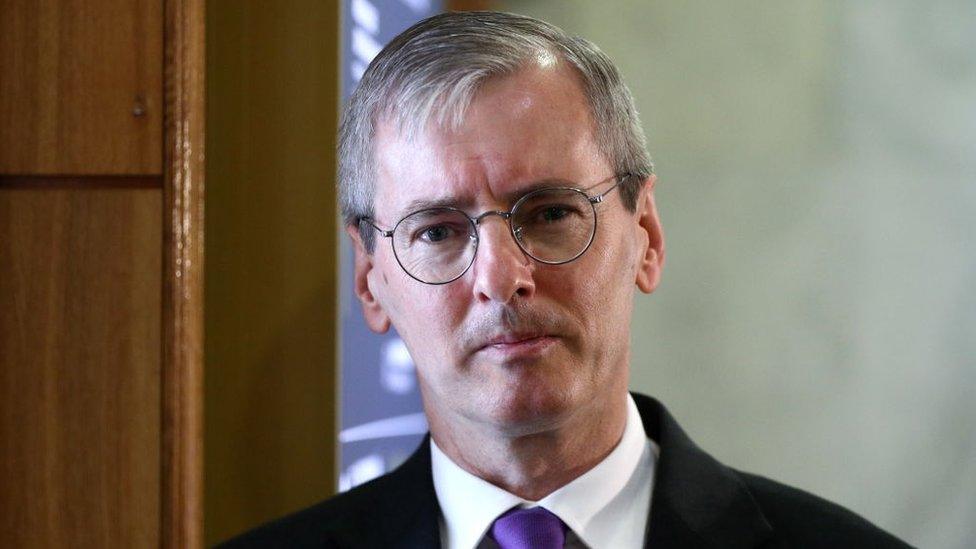
Sir Laurie Bristow was appointed British ambassador to Afghanistan in June
Labour has called for the urgent expansion of the government's resettlement scheme for Afghans to ensure those who helped British forces are not "abandoned".
The party's leader Sir Keir Starmer said the prime minister needed to "step up to the plate, show some leadership and some urgency", adding that the evacuation of UK nationals and eligible Afghans had to be the priority.
Downing Street said details of wider asylum plans for Afghan citizens and any changes to eligibility for the resettlement scheme would be set out in the coming days.
Tory MPs have also criticised the UK government's response.
Former Defence Minister Johnny Mercer, who served in Afghanistan, said in a tweet, external that ministers needed to "take responsibility" and the country "deserved better than the nil response this weekend".
British army veteran, Dave Watson: 'It's upsetting to see our work go to waste'
Another former Defence Minister, Tobias Elwood, described the "chaotic exodus" from Kabul airport as "Saigon 2.0" - a reference to the 1975 evacuations of US personnel when the North Vietnamese army captured the city.
Mr Ellwood, a former British Army captain, said in a tweet, external: "If this is not Saigon 2.0 I don't know what is. Is this how we thought we'd depart Afghanistan? I repeat my call for a UK inquiry."
The Taliban was able to seize control of Afghanistan after most foreign troops pulled out of the country.
President Joe Biden - who has promised to complete the withdrawal of all US troops by 11 September - defended the decision saying he could not justify an "endless American presence in the middle of another country's civil conflict".

What was originally said about the deal with the Taliban?

On 29 February 2020 in Doha, Qatar, then US President Donald Trump signed a deal to withdraw American and other allied (including British) troops from Afghanistan by May 2021.
In the same deal were broad obligations on the Taliban to take steps to prevent groups including al-Qaeda from threatening the security of the US and its allies.
At the time, UK Defence Secretary Ben Wallace expressed support for the deal, calling it a "small but important step towards the chance for Afghans to live in peace, free from terrorism".
In April 2021 US President Joe Biden announced he would continue with the withdrawal, by the later and symbolic date of 11 September 2021, eventually announcing in July that the US's "military mission" would conclude on 31 August.
Mr Wallace appeared to continue to support the deal, confirming the UK would withdraw its troops as planned but saying any attacks on existing troops would be "met with a forceful response".
But by 24 May, he told Parliament that it was a "regret for most of the Nato allies" that the US chose not to make the peace agreement "conditions-based at the end".
Last Friday Mr Wallace described the Doha deal as a "rotten deal", and today clarified he believed the "die was cast when the deal was done by Donald Trump".
"President Biden inherited a momentum that had been given to the Taliban because they felt they had now won," he said.

- Published16 August 2021
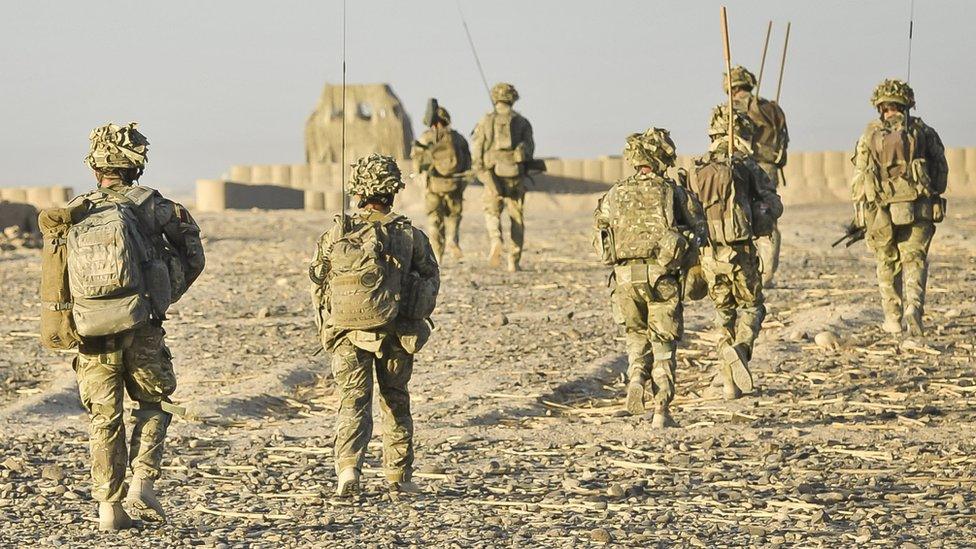
- Published17 August 2021
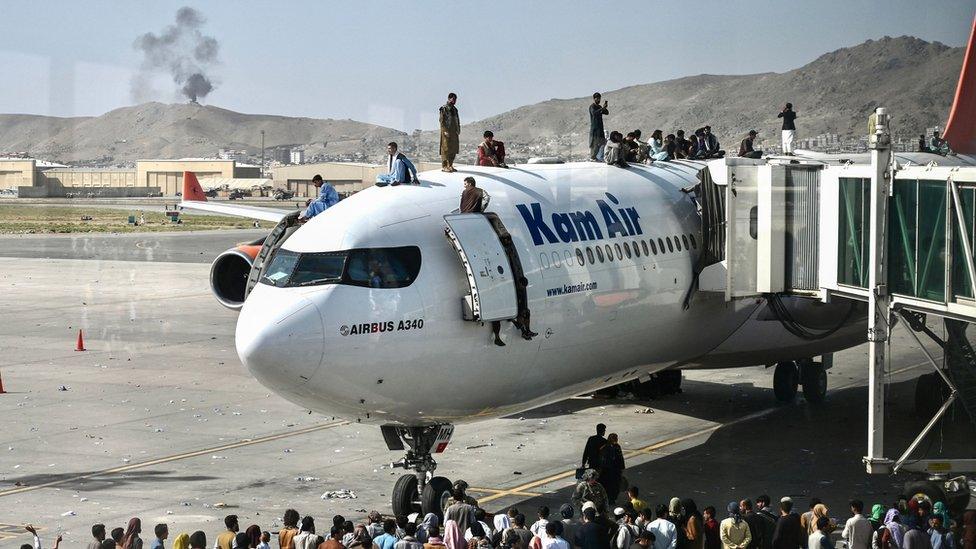
- Published15 August 2021
